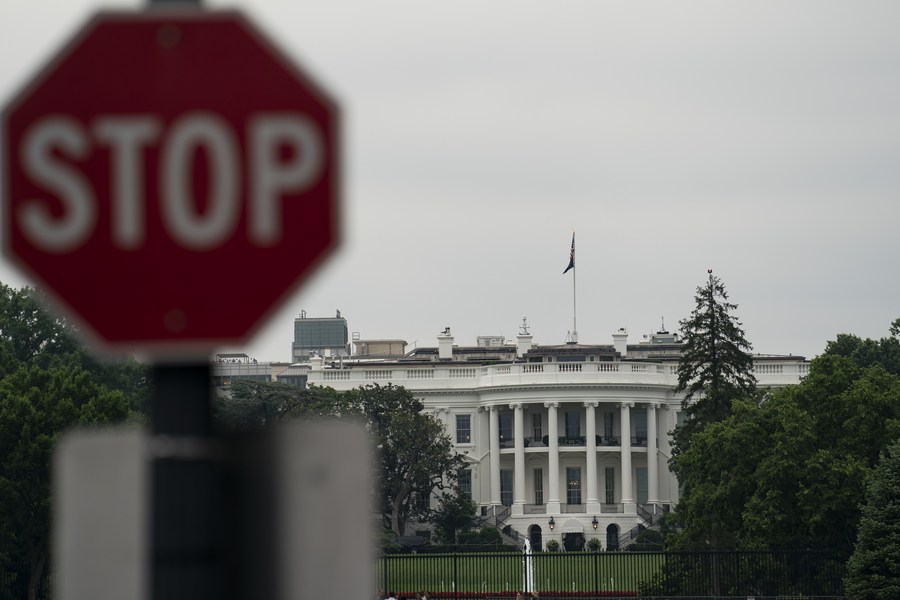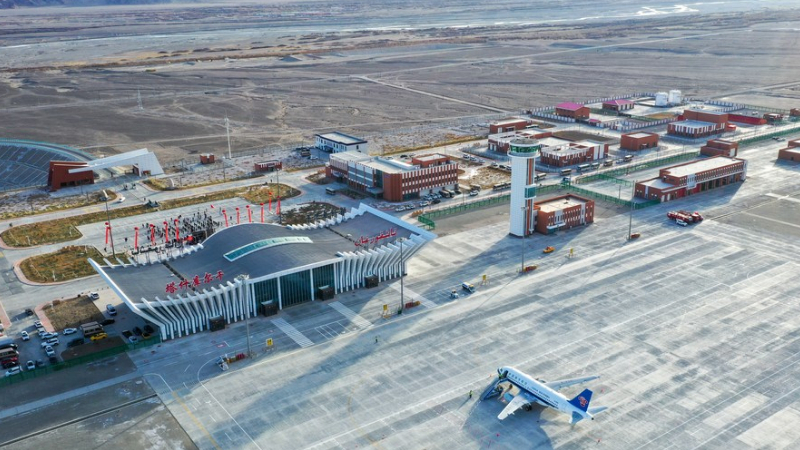
Photo taken on June 22, 2022 shows the White House and a stop sign in Washington, D.C., the United States. (Xinhua/Liu Jie)
Though Biden gave his word just weeks ago, the U.S. side has acted in a completely opposite direction, throwing its political credibility far away. If the United States persists in playing with fire on the Taiwan question, it is only a matter of time before it is brought to reckoning.
BEIJING, Dec. 27 (Xinhua) -- U.S. President Joe Biden last week signed into law the National Defense Authorization Act for Fiscal Year 2023. This piece of act contains quite many provisions that seek to stigmatize China. More alarmingly, it sends gravely wrong messages to separatist forces in Taiwan, and is widely perceived as a further step of Washington to suppress Beijing with the Taiwan question.
As a U.S. domestic legislation, the act should have focused on its own affairs rather than interfere with other countries in disregard of international law. However, it has peddled the "China threat" narrative based on twisted facts, meddling in China's internal affairs, particularly in the Taiwan question.
The bill claimed to authorize 10 billion U.S. dollars in security assistance and 2 billion dollar in military loans to Taiwan over the next five years and fast-track arms sales to the island. Behind these moves to fund and weaponize the Taiwan separatists is Washington's ulterior motive to provoke confrontation and wreak havoc on peace and stability across the Taiwan Straits.
In terms of the Taiwan question, the United States has long lost its international credibility since it flagrantly broke international law and political commitments.
From the Shanghai Communique in 1972, to the China-U.S. Joint Communique on the Establishment of Diplomatic Relations in 1978, and to the August 17 Communique in 1982, the United States has put a clear commitment down in black and white that there is but one China in the world, that Taiwan is part of China, and that the Government of the People's Republic of China is the sole legal government of China.
In the August 17 Communique, the U.S. government stated that it does not seek to carry out a long-term policy of arms sales to Taiwan; that its arms sales to Taiwan will not exceed, either in qualitative or in quantitative terms, the level of those supplied in recent years since the establishment of diplomatic relations between the United States and China; and that it intends to gradually reduce its sale of arms to Taiwan, leading, over a period of time, to a final resolution.
Nonetheless, the United States has failed to honor its commitments, continuing down the wrong path of manipulating the Taiwan question. Earlier this month, the Biden administration has announced its seventh arms sale to Taiwan since taking office in January 2021.
Washington's moves seriously violated the one-China principle and the provisions of the three joint communiques, breached its political promises to the Chinese side, and laid bare some U.S. political forces' scheme to curb China by sabotaging peace and stability across the Taiwan Straits.
Analysts in Taiwan observed that U.S. arms sales to Taiwan have nothing to do with safeguarding the island's interests. The truth is that Washington simply treats Taiwan as a cash machine and a pawn, only to leave Taiwan people in a more dangerous situation.
What Washington has done regarding the Taiwan question typifies its practices of unilateral bullying and double games. Seeking dialogue and containment at the same time, the U.S. side has stabbed China in the back while discussing cooperation at once.
During a meeting between Chinese President Xi Jinping and Biden in Indonesia's Bali last month, Xi stressed that the Taiwan question is at the very core of China's core interests, the bedrock of the political foundation of China-U.S. relations, and the first red line that must not be crossed in China-U.S. relations.
For his part, Biden reiterated the United States does not seek a new Cold War, does not seek to revitalize alliances against China, does not support "Taiwan independence," does not support "two Chinas" or "one China, one Taiwan," and has no intention to have a conflict with China. The U.S. side has no intention to seek "de-coupling" from China, to halt China's economic development, or to contain China, he added.
Though Biden gave his word just weeks ago, the U.S. side has acted in a completely opposite direction, throwing its political credibility far away. A major power like the United States shouldn't say one thing yet do another.
For China and the United States, one top priority for now is to translate the common understandings reached by the two heads of state in Bali into practical policies and concrete actions, which is front and center for the two countries in order to stabilize and develop bilateral ties in the next stage.
Taiwan belongs to China. How to resolve the Taiwan question is the Chinese people's own business. No external interference is allowed.
On Sunday, the Eastern Theater Command of the Chinese People's Liberation Army organized multi-unit joint combat readiness patrols and real-combat drills in the sea and airspace around the Taiwan island. This is a resolute response to the recent escalation in the U.S.-Taiwan collusion.
Time for the U.S. side to return to the right path of the one-China principle and the three China-U.S. joint communiques, and refrain from implementing the negative China-related sections in the bill or moving even further down the wrong and dangerous road.
If the United States persists in playing with fire on the Taiwan question, it is only a matter of time before it is brought to reckoning. ■












